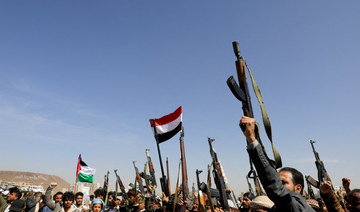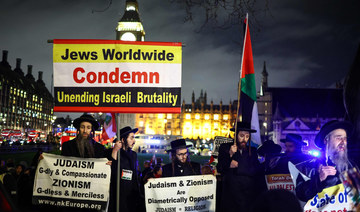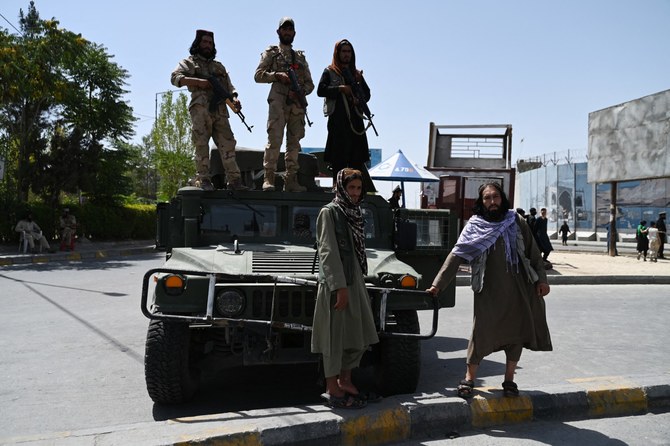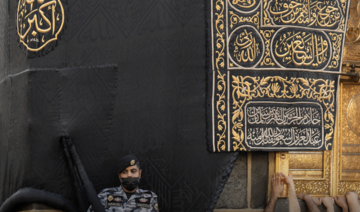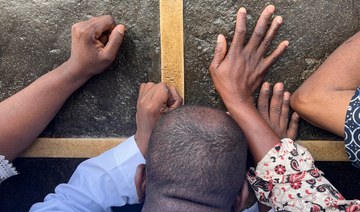Dearborn: It’s common to hear residents chatting in Arabic just as often as English in this Detroit suburb’s stores or mosques, those buildings themselves often sporting bilingual signage out front.
But no matter the language, residents in this Arab American and Muslim stronghold in the Midwestern state of Michigan are convinced President Joe Biden, as he steadfastly stands by Israel in its war in Gaza, is not listening to them.
“Vote for Palestine. No Biden,” political organizer Samra’a Luqman says in English, passing out fliers outside a mosque after prayers.
“Don’t vote for Biden,” the activist with Yemeni origins adds in Arabic.
“Of course,” respond many passersby.
As the Gaza Strip death toll climbs, residents here — once firmly in the Democratic fold — are turning against the president in a crucial swing state he won by just 150,000 votes in 2020.
Some are hoping to pressure Biden to back off from his Israel support and call for a ceasefire. Others, like Luqman, say they would never vote for him.
“He’s committing the genocide. He’s funding it,” Luqman, a campaign leader with a group called Abandon Biden, tells AFP.
A campaign is underway by Luqman and others urging voters to vote “uncommitted,” or write in “Free Palestine” on their ballots in the state’s primary next week — a symbolic gesture, since Biden faces no serious challengers for the Democratic nomination.
“This is a campaign about pressuring our current president who can do something about the mass killing of children,” says Abbas Alawieh, a former Democratic chief of staff on Capitol Hill and member of the Listen to Michigan campaign group.
“In this community there are a lot of people who are directly harmed by war,” the Lebanese-born Alawieh tells AFP.
Biden, he says, “is threatening to lose this community. Not just in November, but perhaps for a generation to come.”
The war started when Hamas launched its attack on October 7, resulting in the deaths of about 1,160 people in Israel, mostly civilians, according to an AFP tally of official Israeli figures.
But concern has mounted amid the high civilian toll in Israel’s retaliatory campaign, now at 29,313 people dead, according to the health ministry in Hamas-run Gaza.
Listen to Michigan began as a pressure campaign, but some voters say their frustration with the president is permanent.
Voting for Biden was the “worst mistake of my life,” says Mohamed Alemara, a 23-year-old medical student of Iraqi descent.
“You don’t kill 30,000 of our people and expect us to vote for you.”
Arab Americans’ vows to ditch Biden often baffle liberal political pundits.
What will Muslims and Arabs do, the thinking goes — vote for Donald Trump, the Republican behind the “Muslim ban” immigration policy, whose supporters flirt with ideas like “Christian nationalism“?
“We’re not a stupid community,” says Luqman. “I’ve survived a Muslim ban, but those kids in Gaza have not survived Joe Biden.”
“My intention is not to vote in an Islamophobe, another genocidal maniac,” she adds. Yet she tells AFP, “the only way I would vote for Biden is if he resurrected” the Gaza dead.
In America’s two-party system, where voters often hold their nose to pick candidates they don’t back 100 percent, 27-year-old nurse Fatima Elzaghir says that “at this point, the lesser evil is Trump.”
Others, like Alawieh, reject the premise of the question.
“How dare you come to me and say, ‘Oh, but later, Trump will be your fault,’” he says.
“Call your representative. Tell them you want a ceasefire.... Once we stop the bloodshed, then we can talk about the political consequences.”
Biden will also have to deal with Michigan’s unions — where some are defecting from the labor-friendly president’s camp.
Many union and workingclass voters already support Republicans, drawn in by their conservative social policies.
But for Merwan Beydoun, a steel mill worker and member of the United Autoworkers Union, Gaza was the breaking point.
“Furious” at Biden, whom the UAW endorsed, Beydoun stopped his contributions to the union’s political arm.
Beydoun says he still believes “in a lot of Democratic policies” and would rather not say how he’ll vote in November. But to earn Beydoun’s vote, the president “needs to wake up” and “change his ways.”
The Biden administration has tried to assuage Arab and Muslim voters’ concerns in part by portraying the president as frustrated with Benjamin Netanyahu’s government.
But US weapons have flowed to Israel since October 7, while Washington’s efforts to broker a second pause in fighting have failed, and on Tuesday the US blocked a UN Security Council resolution calling for a ceasefire.
“My intention is to punish Biden for what he’s doing now,” says Luqman. “For the betrayal that he’s done to me and all the community members that have voted for him.”
In Michigan, Arab American voters vow to ‘punish’ Biden
https://arab.news/nr5w2
In Michigan, Arab American voters vow to ‘punish’ Biden
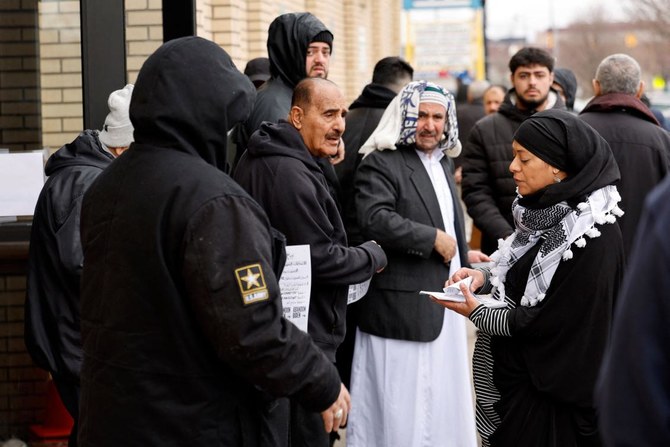
- As Gaza Strip death toll climbs, residents once firmly in the Democratic fold — are turning against the president in a crucial swing state he won by just 150,000 votes in 2020.
Four arrested for duping young Indian men into fighting for Russia in Ukraine
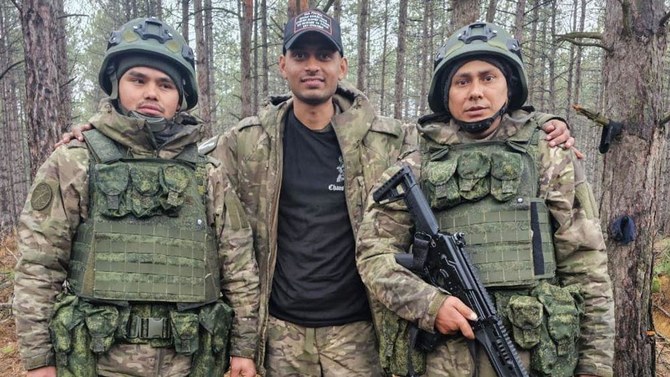
- Families of two Indian men who were killed in the war said that they had gone to Russia expecting to work as ‘helpers’ in the army
- At least 200 Nepalis are estimated to be serving in the Russian army and about 100 are missing
About 35 Indian men were duped in this manner, the Central Bureau of Investigation (CBI) said in March.
The four Indian nationals arrested were a translator, a person facilitating visa processing and the booking of airline tickets as well as two “main recruiters” for the southern states of Kerala and Tamil Nadu, the CBI said late on Tuesday.
The investigation “is continuing against other accused persons who are part of this international network of human traffickers,” the CBI said.
The families of two Indian men who were killed in the war have told Reuters they had gone to Russia expecting to work as “helpers” in the army.
India’s foreign ministry says each case has been “strongly taken up” with Russia. Moscow has not responded to repeated requests from Reuters for comment.
Other South Asian countries have also warned their citizens against such trafficking networks after multiple cases emerged of people being similarly duped into fighting in the Russian army.
Sri Lanka said on Wednesday that “a number” of its retired war veterans were lured to the Russia-Ukraine war front with the promise of a “handsome salary,” citizenship, and other benefits for serving in the army, none of which were granted.
“A significant number of war veterans have died and sustained injuries on the battlefield,” Sri Lanka’s Defense Ministry said, adding that the law would be “strictly enforced” in the matter.
A retired major and an employment agent have been arrested in this connection.
Nepal, which paused issuing work permits for Russia and Ukraine in January, has said several young unemployed Nepalis had been illegally recruited into the Russian army by agents who charged them hefty sums for visas.
At least 200 Nepalis are estimated to be serving in the Russian army and about 100 are missing, officials have said.
India has refused to condemn Russia over the war, calling instead for dialogue and diplomacy to end the conflict. The two countries have enjoyed a close relationship for decades, trading in items from fighter jets to tea.
India has also increased its purchase of cheap Russian oil since the war, with Moscow emerging as its top oil supplier in the last financial year for the second year in a row.
Police clearing Pro-Palestinian tent encampment at George Washington University, dozens arrested
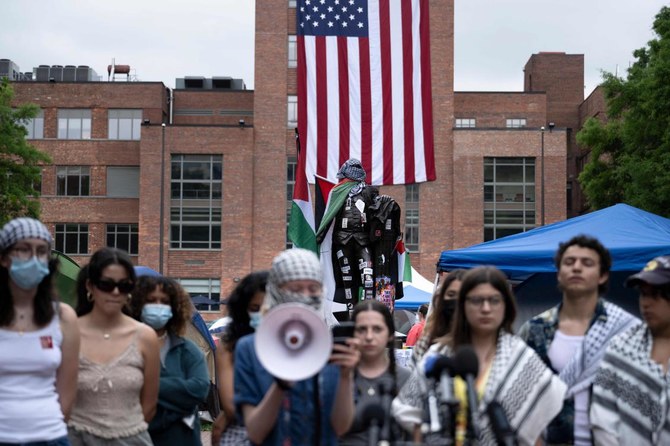
- A pro-Palestinian tent encampment was cleared at the University of Chicago on Tuesdday
- Tensions have continued to ratchet up in standoffs with protesters on campuses across the US
WASHINGTON: Police began to clear a Pro-Palestinian tent encampment at George Washington University early Wednesday and arrested dozens of protesters, hours after dozens left the site and marched to President Ellen Granberg’s home.
Officials at the university in Washington, D.C., had warned of possible suspensions for students engaging in protest activities on University Yard.
“While the university is committed to protecting students’ rights to free expression, the encampment had evolved into an unlawful activity, with participants in direct violation of multiple university policies and city regulations,” the university said in a statement.
Local media had reported that some protesters were pepper sprayed as police stopped them from entering the encampment and nearly 30 people had been arrested, according to community organizers.
In a statement, the District of Columbia’s Metropolitan Police Department said arrests were made for assault on a police officer and unlawful entry, but a number of arrests wasn’t immediately given. The department said it moved to disperse demonstrators because “there has been a gradual escalation in the volatility of the protest.”
Tuesday evening, protesters carrying signs that read, “Free Palestine” and “Hands off Rafah,” marched to Granberg’s home. Police were called to maintain the crowd. No arrests were made.
This comes as Mayor Muriel Bowser and MPD Chief Pamela Smith are set to testify about the District of Columbia’s handling of the protest at a House Committee on Oversight and Accountability hearing on Wednesday afternoon.
A pro-Palestinian tent encampment was cleared at the University of Chicago on Tuesday after administrators who had initially adopted a permissive approach said the protest had crossed a line and caused growing concerns about safety.
University President Paul Alivizatos acknowledged the school’s role as a protector of freedom of speech after officers in riot gear blocked access to the school’s Quad but also took an enough-is-enough stance.
“The university remains a place where dissenting voices have many avenues to express themselves, but we cannot enable an environment where the expression of some dominates and disrupts the healthy functioning of the community for the rest,” Alivizatos wrote in a message to the university community.
Tensions have continued to ratchet up in standoffs with protesters on campuses across the US — and increasingly, in Europe — nearly three weeks into a movement launched by a protest at Columbia University. Some colleges cracked down immediately on protests against the Israel-Hamas war. Among those that have tolerated the tent encampments, some have begun to lose patience and call in police over concerns about disruptions to campus life, safety and the involvement of nonstudents.
Since April 18, just over 2,600 people have been arrested on 50 campuses, figures based on AP reporting and statements from universities and law enforcement agencies.
But not all schools are taking that approach, with some letting protesters hold rallies and organize their encampments as they see fit.
The president of Wesleyan University, a liberal arts school in Connecticut, has commended the on-campus demonstration — which includes a pro-Palestinian tent encampment — as an act of political expression. The camp there has grown from about 20 tents a week ago to more than 100.
“The protesters’ cause is important — bringing attention to the killing of innocent people,” university President Michael Roth wrote to the campus community Thursday. “And we continue to make space for them to do so, as long as that space is not disruptive to campus operations.”
The Rhode Island School of Design, where students started occupying a building Monday, affirms students’ rights to freedom of speech and peaceful assembly and supports all members of the community, a spokesperson said. The school said President Crystal Williams spent more than five hours with the protesters that evening discussing their demands.
On Tuesday the school announced it was relocating classes that were scheduled to take place in the building. It was covered with posters reading “Free Palestine” and “Let Gaza Live,” and dove was drawn in colored chalk on the sidewalk.
Campuses have tried tactics from appeasement to threats of disciplinary action to resolve the protests and clear the way for commencements.
At the University of Chicago, hundreds of protesters gathered for at least eight days until administrators warned them Friday to leave or face removal. On Tuesday, law enforcement dismantled the encampment.
Officers later picked up a barricade erected to keep protesters out of the Quad and moved it toward the demonstrators, some of whom chanted, “Up, up with liberation. Down, down with occupation!” Police and protesters pushed back and forth along the barricade as the officers moved to reestablish control.
Dozens detained at Paris pro-Palestinian university protest
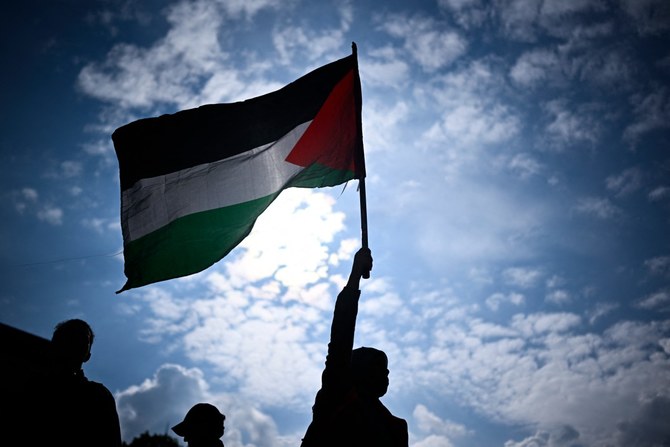
- Prime Minister Gabriel Attal said there would never be a right to disrupt France’s universities with such protests
- Police acted after about 100 students had been occupying a lecture theater for two hours
Paris: French police detained 86 people following an operation to remove students staging a pro-Palestinian occupation at the Sorbonne university in Paris, prosecutors said Wednesday.
Those arrested in the police operation on Tuesday night were being held for a variety of public order offenses, said the statement.
They include wilful damage, rebellion, violence against a person holding public authority, intrusion into an education establishment and holding a meeting designed to disrupt order. Some are also being held for participation in a group with a view to preparing violence or damage to property.
They can be held for an initial 24 hours, which can then be extended another 24 hours.
The day before police moved in, Prime Minister Gabriel Attal said there would never be a right to disrupt France’s universities with such protests.
Police acted after about 100 students had been occupying a lecture theater for two hours in “solidarity” with the people of Gaza, an AFP journalist on site noted.
Tuesday night’s police operation at the Sorbonne — and at another university on Paris’s Left Bank, Science Po university — followed interventions to end similar protests at the end of April.
Students at universities in several European countries have followed the actions on US campuses where demonstrators have occupied halls and facilities to demand an end to partnerships with Israeli institutions because of Israel’s punishing assault on Gaza.
Police have also intervened to clear campuses in the United States, Netherlands and Switzerland.
Palestinian militant group Hamas on October 7 attacked southern Israel, resulting in the deaths of about 1,170 people, mostly civilians, according to an AFP tally of Israeli official figures.
Israel estimates that 129 hostages seized on October 7, out of the 253 taken, are still being held in Gaza, including 34 the military says are dead.
Israel’s retaliatory offensive has killed at least 34,789 people in Gaza, mostly women and children, according to the health ministry in the Hamas-run besieged Palestinian territory.
First Bangladeshi pilgrims ready to depart for Hajj
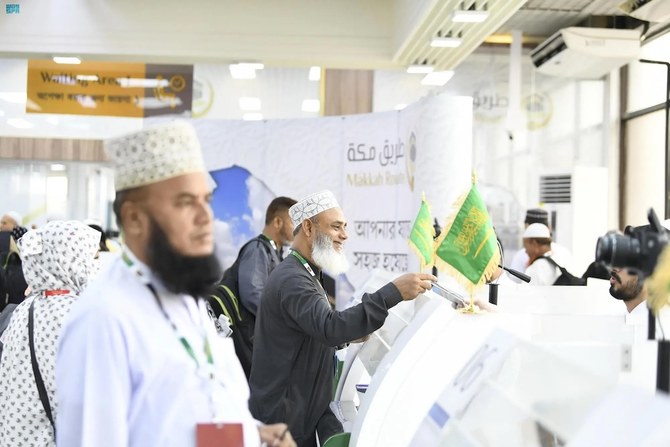
- The country’s quota this year is 127,000 pilgrims
- First flight leaves for Saudi Arabia on Thursday
DHAKA: Thousands of Bangladeshis are going to become some of the earliest Hajj pilgrims to arrive in Saudi Arabia this year, with the first batch scheduled to fly to Jeddah on Thursday.
This year, the Hajj is expected to start on June 14 and end on June 19.
While the pilgrimage itself can be performed over five or six days, pilgrims often arrive early, knowing that it may be a once-in-a-lifetime opportunity to fulfill their religious duty.
The first Hajj flight carrying 419 pilgrims is scheduled to leave for Jeddah from Hazrat Shahjalal International Airport in Dhaka on Thursday morning.
“Our pilgrims will be the first batch of Hajj pilgrims from around the world who will arrive in the Kingdom,” Mohammad Matiul Islam, additional secretary at the Ministry of Religious Affairs, told Arab News.
“Some pilgrims opt to travel earlier to the holy land, as it gives them spiritual peace. It’s the pilgrims’ choice to determine their time of travel.”
This year, Saudi Arabia granted Bangladesh a quota of 127,000 pilgrims to perform the spiritual journey that is one of the five pillars of Islam. Because of the rising cost of airfares to the Middle East, fewer Bangladeshis than expected will be able to go.
Bangladesh, one of the most populous Muslim-majority countries, also struggled to meet the quota in 2023, when the minimum government rate for Hajj was $6,000.
To prevent the same scenario during the 2024 pilgrimage season, the Bangladeshi government reduced the cost by $1,000, but high inflation at home prevented a third of prospective pilgrims from registering.
“As we fell short of meeting the number, a quota of 41,000 is surrendered to Saudi Arabia,” Islam said. “The surrendering of this (remaining slots) will not affect the receiving of our Hajj quota next year.”
Saudi visa registration for Bangladeshis will end on Saturday, and most of them will be departing over the next few weeks from Dhaka, where they will be assisted by Saudi authorities under the flagship Makkah Route initiative.
The pre-travel program was launched by the Kingdom in 2019 to help pilgrims to meet all the visa, customs and health requirements at their airport of origin, and save them long hours of waiting before and upon arrival in Saudi Arabia.
From Wednesday, those flying in the next few days can wait for departure at a special Hajj camp near the airport in Dhaka.
“While staying at the Hajj camp, the pilgrims have their Bangladeshi immigration part done. Also, a part of Saudi immigration is being done here as the pilgrims leave their luggage here to Makkah Route authorities,” Islam said.
“The air-conditioned accommodation here is free of cost for the pilgrims ... We suggest the pilgrims from outside Dhaka be at the Hajj camp two days before their flight. The camp can hold more than 5,000 pilgrims at a time.”



